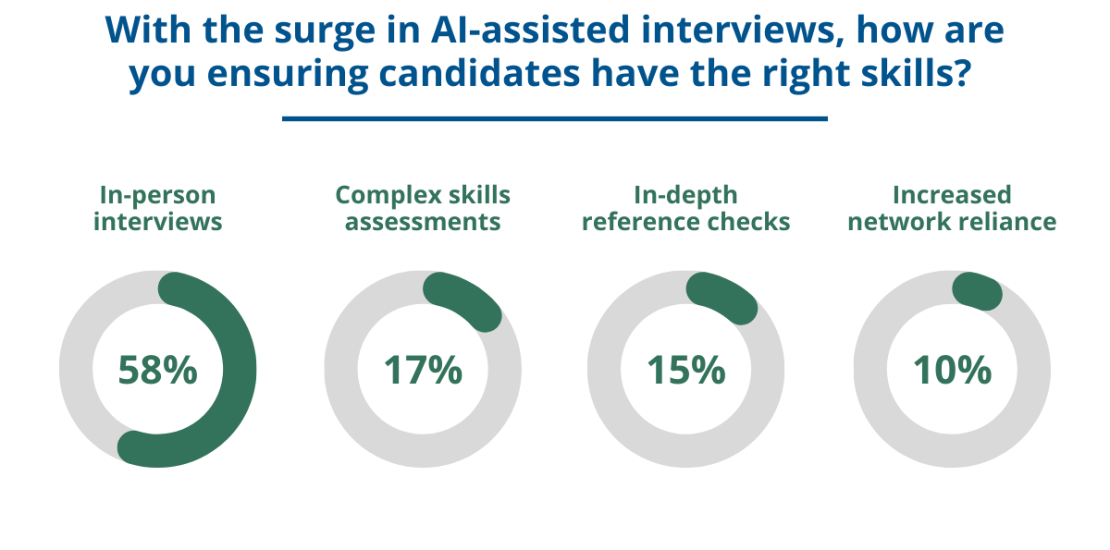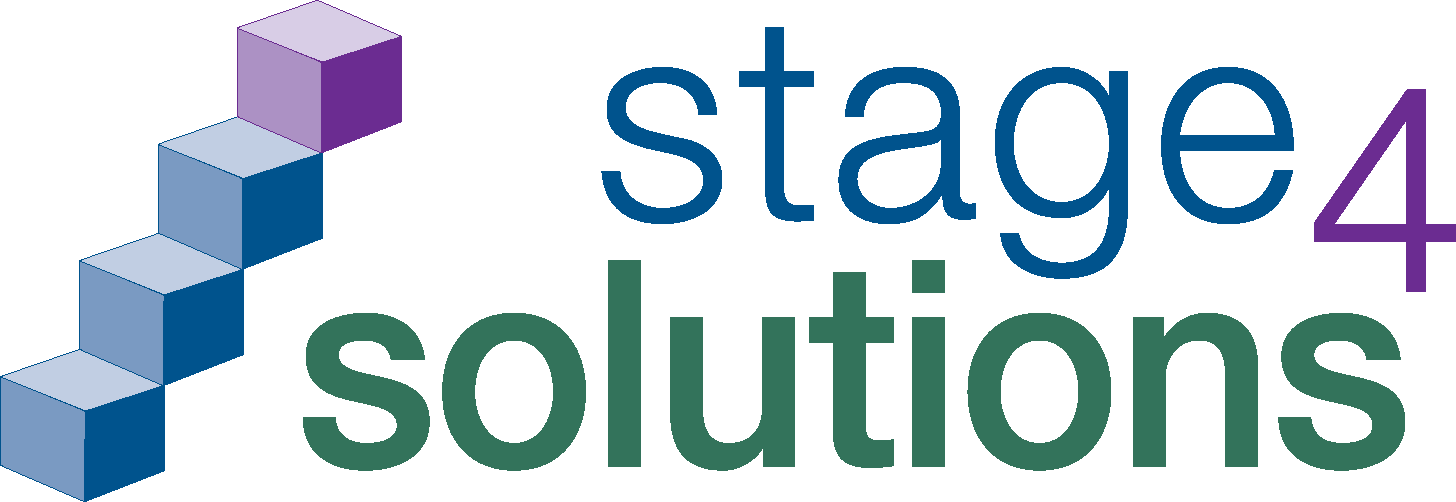Ensuring Candidate Authenticity in an Era of AI-Assisted Interviews
- September 22, 2025
- Posted by: Stage 4 Solutions
- Category: Blog

In recent years, artificial intelligence has been transforming the hiring process, just as it has reshaped nearly every aspect of how organizations operate. Beyond using AI for resume writing and job search tools, there are reports that candidates are increasingly using AI during virtual interviews to generate or refine their answers or even attempt impersonation through deepfakes. Beyond the concerns of ethics and honesty, this environment makes it difficult for employers to be confident that they are evaluating genuine skills and judgment rather than machine-generated responses.
To understand how organizations are adapting to this increasing challenge, we polled our community for their insights.
With the surge in AI-assisted interviews, how are you ensuring candidates have the right skills? (single answer)
- In-person interviews: 58%
- Complex skills assessments: 17%
- In-depth reference checks: 15%
- Increased network reliance: 10%
In-Person Interviews:
The majority of respondents (58%) highlighted in-person interviews as their primary safeguard against AI-assisted responses. With face-to-face interviews, candidates obviously can not rely on “cheating” with AI. So, technical skills assessments and exercises must be done in a room with a live person, and no technology access. Additionally, meeting candidates face-to-face gives hiring managers a clearer view of communication skills, body language, and real-time problem-solving.
Our poll results are in alignment with recent news. Large employers such as Cisco, Google, and McKinsey have reinstated in-person final rounds, and Amazon has publicly stated that candidates using AI during interviews will be disqualified. These developments showcase the heightened focus companies are placing on ensuring that interviews reflect candidates’ genuine skills and capabilities.
To ensure in-person interviews are effective, employers can move beyond standard Q&A by incorporating case-based discussions, role-play scenarios, and collaborative exercises that mirror real workplace challenges. These formats highlight how candidates think on their feet, adapt to new information, and interact with others, skills that are essential to success and difficult to replicate with AI. When in-person interviews are not possible, employers can strengthen virtual interactions by performing a secure digital identity verification, using a mix of structured and unscripted questions, incorporating live proctoring tools and continuous camera monitoring, and ensuring interviewers are trained to recognize red flags such as delayed or overly polished responses.
Complex Skills Assessments
17% of respondents highlighted complex skills assessment as their preferred method. While assessments have long been part of hiring, organizations are increasingly focusing on more sophisticated, role-specific evaluations that provide a true measure of capability. Rather than relying on generic exercises, employers are asking candidates to demonstrate how they would approach tasks that reflect actual job responsibilities. Also, virtual skills assessments are increasingly time-bound, so that the answers must be provided quickly, eliminating or at least reducing the opportunity to leverage AI tools.
For example, when hiring for a data analyst role, teams may provide a real dataset and ask the candidate to clean, analyze, and present insights during a timed session. For application or system related positions, candidates can be asked to troubleshoot a live environment or take control of a shared screen to complete a configuration exercise. In program management or business roles, presenting scenarios such as managing a budget shortfall or balancing competing stakeholder priorities helps reveal how candidates plan and organize their approach. And when take-home assignments are part of the process, employers can schedule a follow-up session for candidates to walk through their work and explain their thought process in detail, ensuring the output reflects their own capabilities even if AI tools were used to complete parts of the assignment.
These approaches test judgment, problem-solving, and communication under realistic conditions. By emphasizing interactive components, organizations gain clearer insight into how candidates think and perform without relying on AI-generated responses.
In-Depth Reference Checks
15% of respondents identified in-depth reference checks as a key method for confirming candidates’ capabilities. References provide one of the most dependable ways to validate actual past performance and experience. Direct feedback from former supervisors helps confirm not only what a candidate has done, but also how they approached responsibilities, managed challenges, and contributed to organizational outcomes.
It is good practice to conduct conversations with two to three former direct reporting managers who directly oversaw the candidate’s work. Conducting these discussions via video calls allows for richer dialogue and greater authenticity. To ensure accuracy, references should be verified against LinkedIn profiles, as today, nearly all business professionals have a LinkedIn profile. Beyond surface-level confirmations, the conversation should delve into specific projects, job responsibilities and the candidate’s approach to decision-making, prioritization, and collaboration to gain deeper insights into their personality and ability to meet role expectations.
Increased Network Reliance
A smaller share of respondents (10%) pointed to greater reliance on networks as a way to ensure candidate quality. Network referrals can provide reassurance that a candidate has demonstrated their skills in real settings, and informal reference checks with mutual connections can further confirm responsibilities, performance, and interpersonal style.
Relying on networks can be an effective safeguard, but it also comes with limitations. Over-dependence on existing circles may narrow the available talent pool and miss the identification of strong candidates who have no connection to internal team members. So employers should treat network referrals as only one talent pool but cast a wider net to find and attract all qualified candidates, and use the other processes to ensure the honest skills of the candidate.
Hiring with Confidence in the AI-Driven Era
AI usage across all areas of business is on the rise, and it will undoubtedly remain part of the hiring landscape. Its role in interviews is likely to expand as tools become more sophisticated. Traditional interviews are no longer sufficient to ensure candidates possess the right skills. To maintain confidence in hiring decisions, organizations need to strengthen their processes by incorporating multiple layers of evaluation.
Combining face-to-face interactions, role-specific complex skills assessments, thorough reference checks, and selective use of trusted networks creates a balanced and reliable hiring approach. These methods help confirm that candidates are authentic, provide a clear picture of who they are, reveal their interpersonal strengths and soft skills, and demonstrate whether they can apply real expertise, adapt under pressure, and deliver consistent performance. By adapting now, employers can strengthen hiring processes to ensure they can build strong teams prepared to thrive in an evolving talent landscape.
At Stage 4 Solutions, we address this challenge through a rigorous, structured screening process designed to validate both skills and cultural fit. Our teams carefully review resumes, conduct multi-step interviews tailored to the specific requirements of each role, and confirm performance through targeted assessments and comprehensive reference checks, based on each client’s needs. By aligning evaluation methods to the complexity and risk level of every position, we deliver candidates who are both highly capable and aligned with our clients’ needs.
How is your organization adapting its hiring practices to ensure candidates truly have the required skills in the age of AI-assisted interviews? Please share with us.

